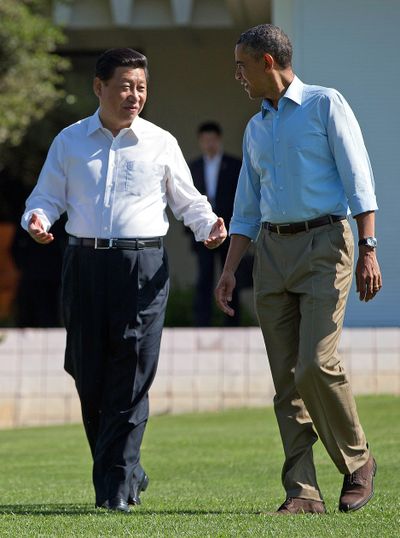Obama presses Xi on cybertheft
U.S., Chinese leaders agree on nuclear-free North Korea

RANCHO MIRAGE, Calif. – President Barack Obama used an unusually lengthy and informal desert summit to present Chinese President Xi Jingping with detailed evidence of intellectual property theft emanating from his country, as a top U.S. official declared Saturday that cybersecurity is now at the “center of the relationship” between the world’s largest economies.
While there were few clear policy breakthroughs on cybersecurity, U.S. officials said Obama and Xi were in broad agreement over the need for North Korea to be denuclearized. And both countries expressed optimism that the closer personal ties forged between the two leaders during the California summit could stem the mistrust between the world powers.
Still, Obama’s national security adviser Tom Donilon said resolving cybersecurity issues would be “key to the future” of the relationship.
Obama told Xi that “if it’s not addressed, if it continues to be this direct theft of United States property, that this was going to be a very difficult problem in the economic relationship and was going to be an inhibitor to the relationship really reaching its full potential,” Donilon said during a briefing with reporters following the summit.
In their own recap of the meetings, Chinese officials said Xi opposed all forms of cyberspying but claimed no responsibility for attacks against the U.S.
Obama and Xi met for about eight hours over the course of two days at the sweeping Sunnylands estate, marking a significant and unusual investment of time for both presidents.
The U.S. president told reporters that the talks were “terrific” as he and Xi walked side by side, both having ditched jackets and ties in a nod to the summit’s informal atmosphere. The leaders closed the summit in low-key style, with no formal statements to the press, just a private tea with Xi’s wife.
Obama and Xi did take a significant step toward tackling climate change, announcing that their countries had agreed for the first time to partner on reducing hydrofluorocarbons, a potent greenhouse gas used in refrigerators, air conditioners and industrial applications.
The discussions on North Korea also proved promising, Donilon said, with the leaders agreeing that North Korea has to be denuclearized and that neither country will accept the North as a nuclear-armed state.
North Korea is estimated to have a handful of crude nuclear devices, with some analysts putting its arsenal at four to eight plutonium bombs.
While China is Pyongyang’s strongest ally and economic benefactor, Xi has signaled a growing impatience with North Korea’s unpredictable and provocative nuclear threats.
“China has taken a number of steps in recent months to send a clear message to North Korea, including though enhanced enforcement of sanctions and through public statements by the senior leadership in China,” Donilon said.